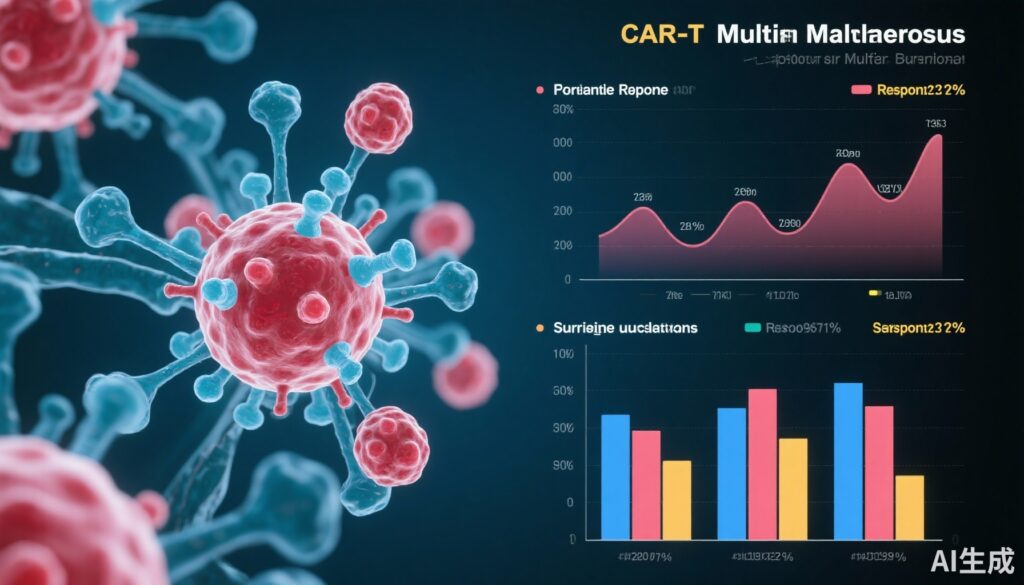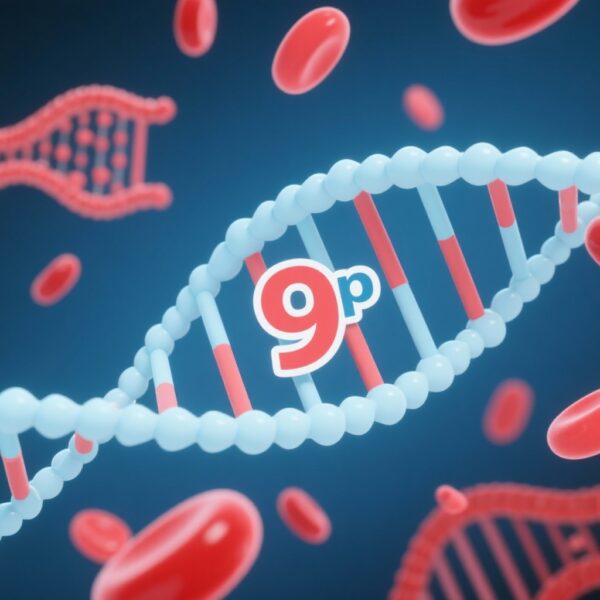Highlight
This comprehensive registry analysis involving 343 heavily pretreated multiple myeloma patients demonstrates a superior overall response rate, progression-free survival, and complete remission attainment with ciltacabtagene autoleucel (cilta-cel) compared to idecabtagene vicleucel (ide-cel). Notably, cilta-cel shows a greater capacity for remission conversion and durable outcomes. Safety profiles were comparable with manageable toxicities. These findings emphasize the importance of individualized CAR T-cell therapy selection in real-world clinical practice.
Study Background
Multiple myeloma (MM) is a plasma cell malignancy characterized by frequent relapses despite multiple lines of therapy. Patients with triple-class exposed relapsed and refractory multiple myeloma (RRMM) face limited therapeutic options and poor prognosis. Chimeric antigen receptor (CAR) T-cell therapies targeting B-cell maturation antigen (BCMA) have revolutionized treatment paradigms by delivering impressive response rates in clinical trials. However, the translation of these results into routine clinical practice across diverse patient populations remains inadequately characterized. This study addresses the knowledge gap by analyzing real-world efficacy and safety of two FDA/EMA-approved CAR T-cell products—idecabtagene vicleucel (ide-cel) and ciltacabtagene autoleucel (cilta-cel)—in Germany’s DRST registry.
Study Design
The German Registry for Stem Cell Transplantation (DRST) prospectively collected data on 343 patients with heavily pretreated RRMM who received either ide-cel (n = 266) or cilta-cel (n = 77) after more than three prior lines of therapy. Baseline demographic and disease characteristics, response rates, survival outcomes, and adverse events were systematically documented. Primary endpoints included overall response rate (ORR), progression-free survival (PFS), and remission conversion rates—particularly achievement of complete response (CR). Safety assessments focused on typical CAR T-related toxicities such as cytokine release syndrome (CRS) and immune effector cell-associated neurotoxicity syndrome (ICANS). Comparisons between ide-cel and cilta-cel cohorts employed propensity score matching and weighted multivariable analyses to correct for potential confounders.
Key Findings
Patient Population: The cohort comprised triple-class-exposed RRMM patients with comparable baseline features, representative of a real-world setting beyond selected clinical trial populations.
Response Rates: Cilta-cel induced significantly higher ORR at 94% versus 82% for ide-cel, with superior CR rates (61% vs 39%). Importantly, cilta-cel demonstrated a greater ability to convert partial responses or lesser states into CR after treatment initiation, highlighting enhanced potency in deep remission induction.
Progression-Free Survival: At 10 months, patients treated with cilta-cel had a markedly improved PFS (76%) compared with ide-cel (47%). Among patients who achieved CR, PFS advantage with cilta-cel was especially pronounced, notably in those with partial response or worse at baseline, underlining the clinical significance of remission conversion in prolonging disease control.
Safety: CRS occurred frequently but predominantly as low-grade events (85% cilta-cel vs 81% ide-cel). ICANS was more common following cilta-cel (25% vs 15%) without translating into increased nonrelapse mortality, which remained low and comparable (7% vs 5% at 10 months). These findings reinforce that both CAR T products have manageable toxicity profiles consistent with clinical trial data.
Statistical Analysis: Multivariable weighted Cox regression following propensity score matching confirmed a significant PFS benefit for cilta-cel with a hazard ratio of 0.48, indicating nearly a 50% risk reduction for progression or death relative to ide-cel.
Comparison With Pivotal Trials: The consistency of outcomes between this registry analysis and international pivotal studies corroborates the external validity of CAR T-cell therapies and supports broader clinical application.
Expert Commentary
The German DRST registry analysis offers valuable real-world evidence supporting cilta-cel’s superior efficacy over ide-cel in heavily pretreated MM patients. Enhanced remission conversion appears pivotal in extending PFS, suggesting that depth of response remains a critical therapeutic goal. This aligns with mechanistic distinctions between the two products, such as cilta-cel’s dual-epitope targeting potentially translating into stronger tumor cytotoxicity.
Nonetheless, interpretation should consider potential selection biases inherent to registry studies despite rigorous propensity matching. Continued long-term follow-up is warranted to assess overall survival impacts and late toxicities. Integration of patient-specific factors, including disease biology and comorbidities, into CAR T product choice remains an important clinical challenge. Future research may explore combination approaches and mechanisms to optimize remission durability.
Conclusion
This registry analysis from Germany provides compelling evidence that ciltacabtagene autoleucel offers superior clinical benefit over idecabtagene vicleucel in relapsed and refractory multiple myeloma by facilitating deeper and more durable remissions. Both agents maintain favorable safety profiles consistent with prior trials. These findings emphasize the need for personalized CAR T-cell therapy selection to maximize patient outcomes in routine practice and highlight remission conversion as a key therapeutic endpoint. Ongoing real-world data collection will continue to refine understanding and inform guidelines in this rapidly evolving field.
Funding and Trial Registration
The analysis was supported by the German Registry for Stem Cell Transplantation (DRST). Relevant ethics approvals and data collection conformed to national regulatory standards. Specific clinical trial registration numbers are not applicable as this is registry-based observational research.
References
Merz M, Gagelmann N, Smaili S, Flossdorf S, Sauer S, Scheid C, von Tresckow B, Wulf G, Weisel K, Blau IW, Engelhardt M, Wäsch R, Schub N, Teipel R, Hecker J, Waldschmidt J, Besemer B, Baermann BN, Call S, Hansmann L, Ayuk FA, Raab MS, Einsele H, Platzbecker U, Kröger N. Remission conversion drives outcomes after CAR T-cell therapy for multiple myeloma: a registry analysis from the DRST. Blood. 2025 Oct 2;146(14):1677-1686. doi: 10.1182/blood.2025028330. PMID: 40504993.
Kumar SK, Paiva B, Anderson KC, et al. Multiple myeloma. Nat Rev Dis Primers. 2017 Mar 16;3:17046. doi: 10.1038/nrdp.2017.46.
Munshi NC, Anderson LD Jr, Shah N, et al. Idecabtagene vicleucel in relapsed and refractory multiple myeloma. N Engl J Med. 2021 Mar 25;384(8):705-716.
Berdeja JG, Madduri D, Usmani SZ, et al. Ciltacabtagene autoleucel, a B-cell maturation antigen-directed CAR T cell therapy in patients with relapsed or refractory multiple myeloma (CARTITUDE-1): a phase 1b/2 study. Lancet. 2021 May 1;398(10297):314-324.



